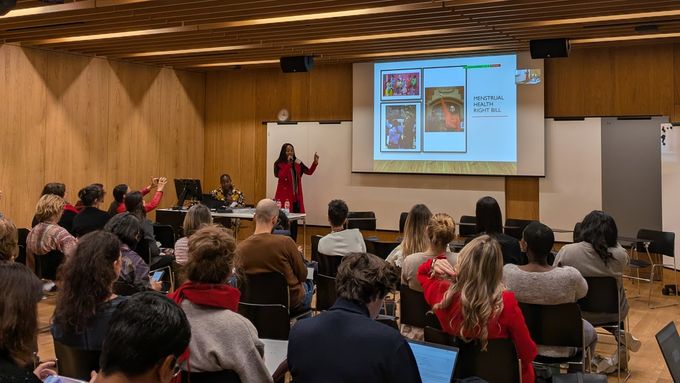Swiss TPH Symposium: Women and Gender in Global Health
20.11.2024
Today, on 20 November 2024, Swiss TPH organises a symposium entitled “Women and Gender in Global Health” in Allschwil near Basel. The symposium brings together around 160 experts from academia, public administration, international organisations and the private sector. The aim of the symposium is to share insights and develop innovative solutions to improve the health and well-being of women and girls around the globe.

In an engaging session on menstrual health equity, Lucy Khofi from the University of Witwatersrand spoke about menstrual health activism in South Africa. (Photo: V. Busson/Swiss TPH)
Women worldwide face unequal conditions when it comes to their health. On the one hand, socio-cultural factors, such as unequal power relations between men and women, uneven educational and financial opportunities and gender-based violence often prevent women from accessing quality healthcare. On the other hand, there is a major research gap in gender medicine. Many medical studies are still predominantly based on the male body, overlooking critical biological and immunological differences. As a result, treatments that work for men may not be as effective for women.
Leaving no one behind
To address these challenges, the Swiss TPH symposium provides a platform for around 160 experts from different fields to explore how gender perspectives can be better integrated into global health research, policy and practice. Pernille Fenger, Director of the Geneva Representation Office at the United Nations Population Fund, opened the symposium stressing the need for change and the crucial role of partnership: “Women and girls deserve a future where their voices are heard and their right to bodily autonomy is fully respected. Together, we can address challenges, promote gender equality, and build a world where no one is left behind.” In six parallel sessions, the participants discussed a broad range of issues related to women and gender in global health.
Biological differences
Health outcomes differ from men to women, from susceptibility to specific diseases, to variations in symptoms, disease progression, and treatment response. It is therefore crucial to consider biological and immunological differences in research, policy and implementation to ensure that new treatments are effective, accessible and that health prevention strategies are inclusive, recognising the different health risks women face.
Gender and “One Health”
Gender needs to be better addressed in the management of infectious and non-communicable diseases. This is highlighted through the example of “One Health” at the symposium – the intersection of human, animal and environmental health. “Gender inequities hamper effective prevention, preparedness and response to infectious disease epidemics. Mainstreaming gender in the ‘One Health’ approach is therefore necessary for optimal health,” said Salome Bukachi, Associate Professor, Anthropology, Gender and African Studies at the University of Nairobi.
Cancer prevention and care
Cervical cancer is the most common cause of cancer death in women in sub-Saharan Africa. Yet, it is completely preventable through vaccination, screening and timely treatment of pre-cancers. “Every cervical cancer death reflects the failure of our healthcare systems to protect women, even when we know the solutions,” said Mazvita Muchengeti from the National Cancer Registry in South Africa, calling for comprehensive cancer prevention and care strategies tailored to women’s needs.
Menstrual health equity
Natural life stages for women such as menstruation and menopause are often stigmatised, leading to harmful physical, social, and psychological effects. Research on menstrual health, products, and menopause remains limited. “It is crucial to raise awareness and encourage support from healthcare workers, employers, men, and all genders for better menstrual and menopausal health,” said Janet Michel, Scientific Collaborator at Swiss TPH.
Gender-based violence
Health systems play a pivotal role in propagating or addressing gender inequities. At the symposium, participants critically reflected on how health systems reinforce societal norms that perpetuate gender-based violence. To transform health systems into spaces of safety and equity, an intersectional approach is required, ensuring survivors of violence receive the support they need and health workers operate in equitable environments.
Access to maternal health
In the context of maternal health, the importance of innovative approaches in terms of digital solutions for diagnosis and treatment and innovative financing methods to ensure access to quality care in low-resource settings was highlighted. These efforts are key to improving health outcomes and advancing Sustainable Development Goal 3 (SDG 3) on health and well-being.
From research to policy
In the afternoon, the participants will work on concrete solutions in the areas of research, policy, and implementation. “By bringing together diverse perspectives and expertise from different fields and different countries, we aim to develop concrete actions to improve the health and well-being of women and girls around the world,” said Sonja Merten, Head of the Society, Gender and Health unit at Swiss TPH.
Contact

Sonja Merten
MD, PD, PhD, MPH, Prof.
Head of Unit
+41612848387
sonja.merten@swisstph.ch
Stay connected
Subscribe to our newsletter and get all the latest research news, project updates, course and event listings from Swiss TPH.